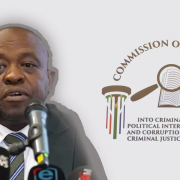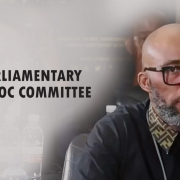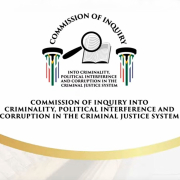|
Getting your Trinity Audio player ready...
|
For many regular followers of the proceedings of the Madlanga commission, the week of Brown Mogotsi’s appearance was both entertaining and confusing.
Mogotsi is the first witness to testify in the commission’s second phase, which seeks to give those implicated by other witnesses a chance to present their side of things. He started giving evidence on Tuesday 18 November and though he has not completed his stint in the witness chair, he has already come under fire from both evidence leader Matthew Chaskalson SC and the three commissioners for the fanciful and often discombobulated testimony he used to defend himself.
Mogotsi has favoured long-winded explanations to questions put to him about his relationships with controversial businessman and alleged cartel boss Vusimuzi ‘Cat’ Matlala on the one hand and now suspended police minister Senzo Mchunu on the other.
His testimony was often interrupted as he was taken to task for the details of the narrative that he seemingly set out to present to clear his name.
Among his claims made last week – which were tested by either Chaskalson or the three commissioners – are that:
- He (Mogotsi) is a long-serving agent working under the crime intelligence division of the South African Police Service (SAPS). This, he said, explains why he is privy to inside information of the SAPS that is otherwise classified and hidden from civilians.
- KwaZulu-Natal (KZN) provincial police commissioner Lieutenant-General Nhlanhla Mkhwanazi and AmaZulu king Misuzulu kaZwelithini are both recruits of the US Central Intelligence Agency (CIA) and have advanced its interest in their duties.
- Mkhwanazi, national police commissioner Major-General Fannie Masemola, and former police minister Bheki Cele all received bribes from Matlala after his company was awarded the SAPS medical and wellness tender. This is in the interest of a campaign they champion to get Cele reinstated as minister.
- Mkhwanazi’s 6 July press briefing – that led to the establishment of the commission – should have never happened. It breached SAPS protocol and its aim was to distract South Africans from the impending leadership changes, akin to a coup, that were coming to the police service.
- The late former police minister Nathi Mthethwa removed Mkhwanazi as acting national police commissioner in 2011 because of his CIA ties. Mthethwa also knew of Mogotsi’s intelligence background and even helped connect him with an individual based in Kenya who would help him in an investigation into Mkhwanazi’s true agenda.
During his press conference, Mkhwanazi named Mogotsi as one of the central figures in alleged police corruption and the infiltration of the SAPS by corrupt individuals. Mkhwanazi claimed that a text message from Mogotsi in September 2024 warned him about impending trouble linked to a probe into Mkhwanazi for allegedly defeating the ends of justice in a police operation relating to a drug possession investigation into the head of Qalakabusha correctional centre in Empangeni, KZN.
A further claim warned Mkhwanazi that there was an internal campaign within the SAPS to discredit him, using the case. Mogotsi positioned himself as an individual who is closely linked to Mchunu and is privy to the inner workings of the highest SAPS ranks.
Prior to the July briefing, Mkhwanazi had mentioned Mogotsi in a meeting of the parliamentary portfolio committee on police, held in March, revealing the latter’s claims of links to Mchunu. Following this, Mchunu denied knowing Mogotsi when he was asked about their relationship, only to renounce that statement later and describe him as a “comrade” in the ANC.
Mogotsi did not deny his relationship with Mchunu and said he had similar connections with other politicians.
When the veracity of his claims was interrogated, he would give a mixture of concessions and persistent defence, calling himself a patriotic South African working in the interest of the country.
Mogotsi’s next appearance is still to be determined between his legal representatives and the commission.





